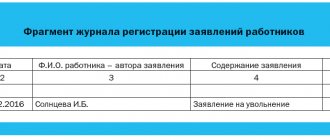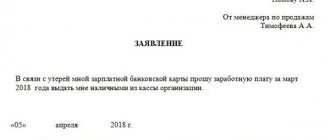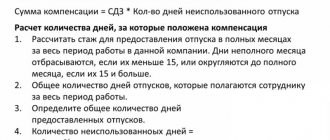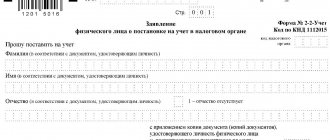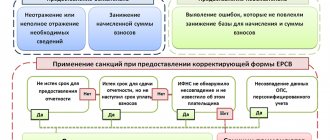Dismissal of a part-time worker
An employment contract concluded with a part-time worker can be terminated either at the request of the employee himself or at the initiative of the employer.
The provisions of the Labor Code of the Russian Federation apply equally to main employees and to those who work part-time, therefore the reasons for dismissal of a part-time worker will be the same as for main employees (Article of the Labor Code of the Russian Federation). In addition, the law provides for part-time workers one more additional basis for terminating the employment relationship - hiring an employee for whom the work performed by the part-time worker will be the main one (Article 288 of the Labor Code of the Russian Federation).
Part-time workers have the right to count on the same guarantees and compensations that are due to main employees, with the exception of those provided to main employees who combine work with study and work in the Far North (Article 287 of the Tax Code of the Russian Federation). Otherwise, part-time workers can count on all guarantees in full. For example, like main employees, when a part-time worker is dismissed, he is entitled to be paid compensation for unused vacation.
Calculation of a part-time worker upon dismissal
In 2021, a part-time worker who is about to resign is entitled to the following mandatory compensation:
- severance pay equal to the average salary for the month (if management was forced to reduce staff or liquidate the company);
- sick pay;
- compensation for unused vacation.
Other types of compensation may be specified in labor or collective agreements. Vacation pay is made together with the calculation for the entire period worked.
Part-time employee resigns on his own initiative
When resigning of his own free will, a part-time employee must comply with the procedure for such dismissal, provided for in Art. Labor Code of the Russian Federation:
- notify the employer in writing of your resignation in advance - at least 2 weeks before the date of termination of the contract (3 calendar days if the contract was concluded for a period of up to 2 months or for a period of seasonal work);
- write a letter of resignation.
The two-week (or other) working period begins the next day after the employer receives an application from the employee, so it is advisable to immediately write such an application, thereby warning the employer in advance. If the parties agree, then the employment relationship can be terminated before the expiration of the work period. The contract can be terminated at any time by agreement of the parties - for this it is necessary to conclude a written agreement (Article of the Labor Code of the Russian Federation). In a number of cases, the employer is obliged to terminate the employment contract within the period specified by the employee in the application - upon retirement, enrollment in a university, and in other cases when continuing to work part-time is impossible.
Depending on the type of part-time job, the form of application submitted by the employee will also differ.
Internal part-time job
When terminating an internal part-time employment contract, two options are possible:
- the employee quits simultaneously from his main place of work and from his part-time job;
- the employee only quits his part-time job, but continues to work in his main position.
Since part-time work requires the conclusion of two different employment contracts, applications for dismissal from the main position and from part-time work are submitted separately (even if dismissal from both positions occurs on the same day).
An entry about internal part-time work, along with the main job, is made in the work book and in the “Information on labor activity” submitted to the Pension Fund of the Russian Federation (form SZV-TD). Upon dismissal, it is indicated that “the employment contract for part-time work was terminated at the initiative of the employee, in accordance with paragraph 3 of part one of Article 77 of the Labor Code of the Russian Federation.”
In this regard, the application should indicate which particular employment contract the employee wants to terminate.
A sample application for an internal part-time worker may look like this:
General concepts
A part-time employment contract is a very common type of employment relationship. It can be concluded by both an ordinary employee and the general director, but there are a number of restrictions. Part-time work is the process of a contractor performing additional work in addition to the main one. This secondary work is also paid on the basis of an employment contract and is carried out in free time from the main work activity.
There are two types of part-time jobs:
- external;
- internal.
The right of individuals to work part-time is regulated by the Labor Code. Internal part-time work involves holding various positions by an employee within one organization, but such additional work should not coincide in time with the main one.
For example, the main work schedule of a plumber at an enterprise is from 9:00 to 15:00. After this time has ended, the person begins to perform the duties of a goods receiver from 22:00 to 24:00. Performing the function of a receiver is precisely a part-time job. The appearance of part-time work also means performing additional work, but at a different enterprise.
Thus, part-time work is hiring an employee to perform some kind of work in his free time from his main job. It is paid according to the hours worked and the position held, after the conclusion of the employment agreement.
Employment nuances
There are no restrictions on hiring part-time jobs. An individual can get such a job at several enterprises at once, but with the proviso that he has a main place of work. If a person does not have one, then it will be illegal to employ him in a vacant position.
The hiring process is the same as for hiring a primary job position. To conclude an employment agreement, the part-time worker provides the employer or his representative with an identification document, and, if necessary, a document on education, health status, recommendations and other certificates, in accordance with the Labor Code. The work book is not presented in this case, since according to the same code it must be in the personnel department at the main place of work.
An employment contract is concluded in accordance with an order or regulation, which specifies the position and terms of payment. After this, the employee can begin to perform his duties. It is important to note that the part-time worker and the employer will not need permission from the manager from the main place of work when concluding such an agreement.
When hiring an employee as a part-time employee, it is advisable to include in the package of documents a certificate received by him from his main place of work, confirming that he has it. Since if an employee is fired from his main job, it will become the basis for his dismissal from his part-time job and his acceptance into it as his main job.
Limitation of activities
An agreement concluded with a part-time partner may be fixed-term or indefinite. In addition to the fact that the person being accepted must have a main job, there are a number of restrictions. Such prohibitions or restrictions are specified in a number of laws and regulations. The following persons fall under them :
- minors;
- those employed in jobs associated with dangerous and harmful working conditions;
- managers of enterprises, institutions, organizations, as well as their deputies (except for workers in scientific, medical and creative activities);
- drivers of motor vehicles;
- deputies.
The length of working time for civil servants is regulated by the Resolution, which states that it cannot be more than four hours a day and exceed a full working day on a day off. In this case, the total working time should not exceed more than half of the monthly standard of basic time.
In addition to mandatory restrictions, there are optional ones, that is, those that are established by the employer. These restrictions are provided for in an employment or collective agreement and depend on the wishes of the employer, and in the case of the second type of agreement, the opinion of the trade union.
Part-time or combination
These two concepts are different and need to be distinguished.
The combination differs primarily in that the employee performs additional tasks assigned to him during his main production time. That is, he is not exempt from his main job. This activity may consist of performing the tasks of another profession or position of another employee. Thus, an important difference is that combining a position occurs during main working hours, and part-time work occurs at different times. In the first case, a separate employment agreement is not concluded , but only the written consent of the performer is required, and no entry is made in the work book. Termination of a combination if the employee refuses to perform the additional scope of tasks assigned to him or the employer cancels the assignment is regulated by the Labor Code. While part-time work is terminated by termination of the employment contract.
For the combination, the executor receives remuneration according to the agreement between him and the guarantor. The type of remuneration is not specified at the legislative level and is determined only by the agreement reached. For comparison: part-time work implies a clearly defined monetary component that the employee will have to receive. For example, a bet with some odds.
The combination is drawn up in the form of an additional agreement to the main agreement and it states:
- nature of the combination (position, profession);
- a list that includes the content of additional work;
- timing of combination;
- amount of additional remuneration.
zayavlenie_uvolnenie_po_sobstvennomu_zhelaniyu_po_sovmestitelstvu.jpg
External part-time job
External part-time work is not the main one for the employee. Accordingly, information about it is not entered into the work book kept by the main employer, but at the request of the employee at his main place of work, they can make an entry about such work - if there are copies of documents from another employer on the hiring and dismissal of a part-time worker (Part 5 of Art. 66 Labor Code of the Russian Federation). The wording of the notice of dismissal will, for example, be as follows: “The employment contract for part-time work at Gamma LLC was terminated at the initiative of the employee, in accordance with paragraph 3 of part one of Article 77 of the Labor Code of the Russian Federation.”
But if the employee refuses to maintain a regular paper work book, information about external part-time work (form SZV-TD) must be submitted not by the main employer, but by the one for whom the employee worked on a part-time basis.
Since one employment contract is concluded with an external part-time worker, the application can be completed in the standard way:
Part-time job reduction
Guarantees of labor rights are provided to part-time employees on an equal basis with main employees, but so do the responsibilities. The possibility of reduction is not excluded by law. Compliance with the established procedure is mandatory. The dismissal of an external part-time worker and an internal part-time employee due to staff reduction is similar to the procedure in relation to main employees.
Namely, the employer is obliged to notify 2 months in advance that changes will be made to the organization’s staffing table (an order is issued about this). During this period, before the day of dismissal, the part-time employee must be offered other vacant positions, if any. Available vacancies may have lower pay and may not be as interesting or prestigious.
You can refuse them, and then the dismissal of the part-time employee due to staff reduction is formalized within the prescribed period. Severance pay is calculated in the same way as for main employees: upon calculation (average monthly earnings) and for another two months if the person does not find a job during this period.
It is important to know that when laying off, there is no difference between a main employee or a part-time employee, and discrimination of rights on this basis is illegal. This statement is confirmed by judicial practice. You can always write a statement if you think that your rights have been violated.
Part-time worker resigns at the initiative of the employer
The procedure for dismissing part-time workers at the initiative of the employer is the same as for other employees. It is impossible to dismiss a part-time employee while he is on vacation or on sick leave, with the exception of cases of liquidation of the enterprise/termination of the activities of the individual entrepreneur.
The part-time employee must be notified in advance, in writing and against signature, of the upcoming dismissal. The length of such notice will depend on the grounds for dismissal. For example, the employer must warn about the upcoming reduction or liquidation of the enterprise (Articles 292, 296 of the Labor Code of the Russian Federation):
- in 2 months - in the general case;
- 7 days (calendar) - if the employee works on seasonal work;
- 3 days (calendar) - if an employment contract is concluded with the employee for a period of up to 2 months.
A special case of termination of an employment contract, which is possible only with a part-time job, is due to the hiring of a part-time worker for whom this place of work will be the main one (Article 288 of the Labor Code of the Russian Federation). The employer is obliged to notify the part-time employee at least 2 weeks in advance about the upcoming dismissal in writing against signature. A variant of this warning:
What may be the grounds for dismissal?
The answer to this question is the same - the same as for key employees. Dismissal cannot be carried out during the period of vacation (regular or maternity leave, for example), or sick leave. The date when the employment contract is terminated, in this case, cannot be earlier than the end of these events. If an employee was hired for a certain period of time, then he can be fired only after it has expired and nothing else.
Dismissal of a part-time worker can be made in three cases:
- at the initiative of the employer (change or reduction in the organization’s staff);
- at the employee’s own request;
- by mutual agreement of the parties to the employment contract.
Order to dismiss a part-time worker
Regardless of the basis for termination of the employment relationship, it is mandatory to issue a dismissal order. When terminating employment contracts with both main employees and part-time employees, employers can use the unified form of order No. T-8 (approved by Resolution of the State Statistics Committee No. 1 of 01/05/2004), or draw up a dismissal order in free form.
When dismissing an internal part-time worker, if he simultaneously quits his main position, the employer must draw up two orders. One order is for dismissal from the main place of work, the other is for dismissal from an internal part-time job.
The day of termination of the part-time worker’s employment contract is the last day of his work. The details and wording of the order are entered into the work book.
The order is presented to the employee against signature. At his request, the employer must hand over a certified copy of the order (and other work documents) to him. If the employee refuses to familiarize himself, a corresponding entry is made on the order (Article 84.1 of the Labor Code of the Russian Federation).
On the last working day, the employer must make a full payment and issue the resigning part-time worker with a work book (if the part-time job is internal, and he is also resigning from his main position), or “Information on work activity” (if the employee refused to keep it, incl. with external part-time jobs).
Termination of a part-time employment contract - sample order:
Country of Soviets
However, the rights of a part-time employee regarding termination of the employment agreement must be respected in full. The point is that it is impossible to dismiss employees who are on sick leave, maternity leave, annual paid leave or parental leave! In such cases, the date of dismissal may be the day the employee returns to work, but not earlier.
An internal part-time worker, in addition to the additional salary he receives, also has the right to vacation, the right to remain on sick leave, and the right to have guarantees and compensation upon dismissal. Dismissal from an internal part-time job should occur in the same way, according to the rules established by labor legislation.
If dismissal occurs at the request of an employee who, for one reason or another, no longer wants to be an internal part-time worker at a given enterprise, but has decided to remain only in the main position, then he must write a corresponding statement. You must notify the company of your desire to resign two weeks in advance.
Vacation compensation
The legislator has established that the vacation of an employee working part-time must coincide with that provided at the main place. Therefore, it is often provided in advance. This fact must be taken into account when calculating vacation compensation for a part-time employee upon dismissal. If there was an advance payment, then you will need to make a deduction for the overused days of the required annual rest. You don’t have to take leave at an additional place of work, but only take monetary compensation - this is the employee’s right.
In accordance with the current legislation of the Russian Federation, namely Article 140 of the Labor Code of the Russian Federation, on the day of dismissal, the management of the enterprise is obliged to make a full financial settlement with the dismissed employee; this norm also applies to part-time workers.
How is an employee’s application for combining positions drawn up? Find out here.
Based on Article 286 of the Labor Code of the Russian Federation, a part-time worker is entitled to a full-length vacation, that is, 28 calendar days.
Accordingly, compensation is calculated based on this rest period, but taking into account the time worked, since in most cases leave is provided in advance.
Since vacation pay is paid in the amount of average earnings, first the employee’s average pay per day is calculated (Article 139 of the Labor Code of the Russian Federation), which is then multiplied by the number of vacation days.
The employee worked for six months, so 6 months is taken. The number of vacation days in 1 month is then calculated, which is 2.33 (28/12), resulting in a total of 14 vacation days. They are then multiplied by the employee's average earnings.
Severance pay
Article 178 of the Labor Code of the Russian Federation states that compensation upon release is paid in the average monthly salary.
The procedure for calculating average earnings is determined by Decree of the Government of the Russian Federation No. 922, where clause 4 and clause 19 state that the average salary of an employee is calculated in a similar way, regardless of his work mode.
That is, for both the main employee and part-time worker, the average salary per month is calculated based on the funds actually accrued to him for the year, taking into account the period worked.
Taking into account the norms of Article 140 of the Labor Code of the Russian Federation, the employer must also pay the employee not only the above-mentioned compensation funds, but also wages from the moment of the last payment.
The estimated payments will include all payments specified above and calculated in the amount established by current legislation.
The procedure for dismissing part-time workers has some differences from terminating the employment relationship with the main employee. But they are not so great - the main thing when terminating cooperation is to comply with the established norms of the law.
